#acéphale
Text
AKEPHALOS
DEATH TO FASCISM
BECOME UNGOVERNABLE
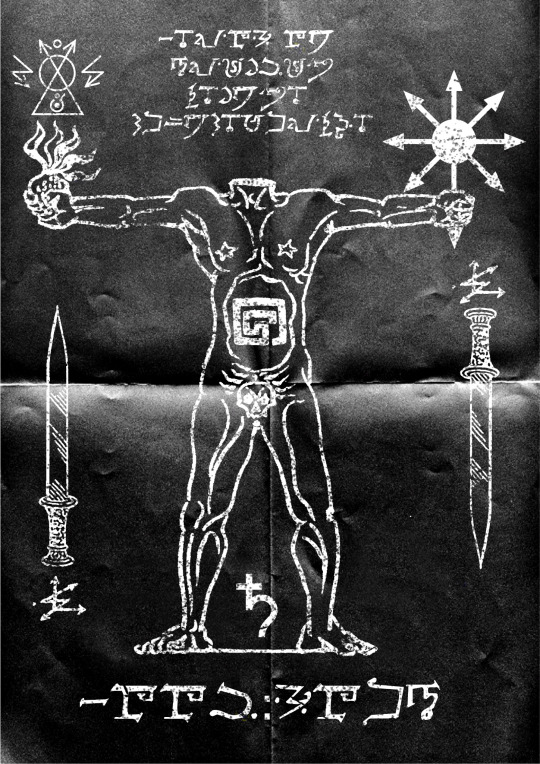
#chaos magick#art#magick#occult#occult art#anarchy#anarchism#georges bataille#acéphale#dkmu#assault on reality
248 notes
·
View notes
Text
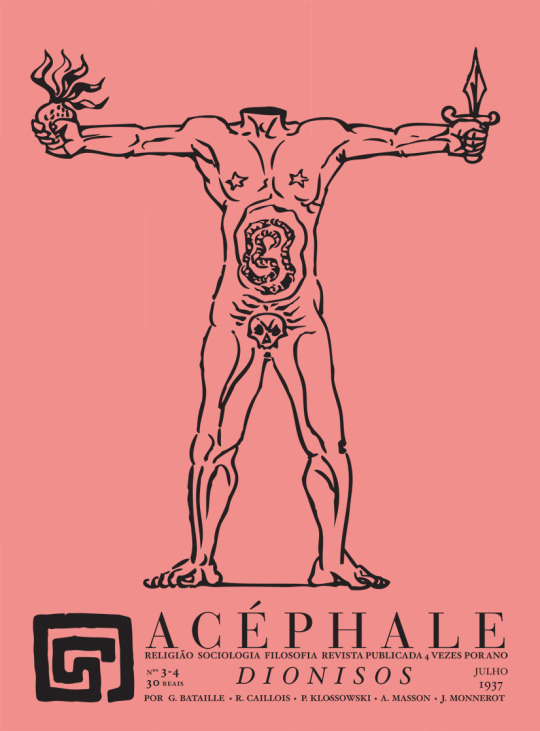
65 notes
·
View notes
Audio

41 notes
·
View notes
Text
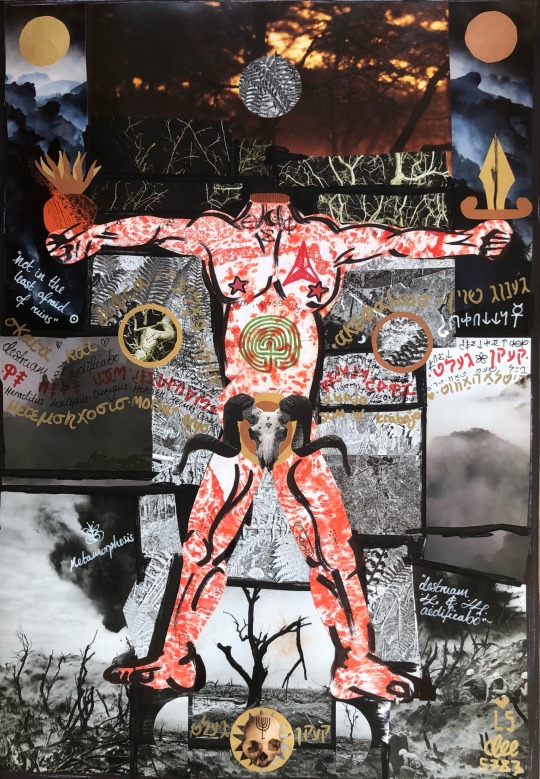
The Monster Akefalos 2023
#georges bataille#bataille#sacred conspiracy#acephale#akephalos#headless#body#nietzche#heraclitus#sade#secret society#acéphale#religion#politics#change#metamorphosis#the durutti column#durutti#not in the least afraid of ruins#destruam et aedificabo#collage#artwork#original#art#creative#illustration#symbolism#symbol
10 notes
·
View notes
Text
youtube
“However, in what may be a truly occult and hidden sub-current of mystical theory and practice are mysticisms of radical Embodiment, anti-extasis. Mysticisms which reject the flight of the soul to some ‘eternal unity’. The dejection of the physicality as somehow lesser-than and the search for the Absolute elsewhere, anywhere, other than the pure corporality of flesh, muscle, and bone.
One of the most radical articulations of such a mystical encounter with the Absolute through pure embodiment was articulated by one of the greatest writers of the twentieth century, Yukio Mishima. In his 1968 essay, Sun & Steel (Taiyō to Tetsu), Mishima would expound on this encounter with the Absolute through the careful cultivation of his physical body through weight lifting, its fruition in the tragic ideal of communal, erotic suffering, and the necessity of death as the culmination of the height of this aesthetic, mystical experience.
Of course, viewing his own essay in light of his death through ritual suicide following a failed coup attempt only two years after the publication of the essay only further deepens and reveals its profound gravity as a statement of Mishima’s commitments to those very ideals. Ideals which remain controversial, even shocking, today, over fifty years later.
(…)
Sun & Steel is a work of mysticism I would argue. A mysticism very nearly unique in the history of mysticism itself. A mysticism which not only rejects words and thoughts (which many mysticisms do. That’s just apophatic mysticism), but it’s what he embraces. It’s one that embraces radical physicality as cultivated by tremendous focus on the cultivation of the muscular physique. It’s a true mysticism of flesh.
Mishima’s experience in the upper air, while profoundly recorded in Sun & Steel, were clearly…clearly not enough for him, however. Even such a limit experience was not and could not be the culmination of pure Solar embodiment. Mishima transformed himself into a work of art, his physical body became a work of art, and like all works of art they must be curated to be properly exhibited and thus appreciated. But this work of art was to prove truly ephemeral because, remember, on Mishima’s reasoning it must come to its aesthetic apex precisely in annihilation.
Like many others, I suspect that Mishima’s attempted coup with members of his militia, the Tatenokai or Shield Society, was him simply and very finely curating that very annihilation, that heroic death that he had searched out. Thus, sun and night, steel and words, culminated in a final day whereby Yukio Mishima, having neatly concluded the Nocturnal words of his Sea of Fertility tetralogy, transformed himself into a Solar, headless god and a Cephalus. That despite the sounds of jeering soldiers and, frankly, botched attempt at seppuku. Reality just always impedes upon even the most careful curation in the end.
As I said, Mishima’s Sun & Steel is a fascinating and, frankly, at times terrifying glimpse into not only the development of one of the most important literary figures of the twentieth century, but also an insight into a radical, self-described anti-Platonic mysticism, whereby the Absolute is experienced precisely and only through the development of Embodiment and not just through Embodiment, but the deliberate cultivation of the Embodiment through years of difficult and painful training, only to have it culminate in its intentional annihilation as pure aesthesis.
Now, I’m certainly not arguing that we should in any way emulate Mishima, but as he is appreciated in the world of literature, I think Sun & Steel must come to be appreciated equally as a work of philosophy and as a work of mysticism. In fact, a work of mysticism that has very little in the way of parallels. And in that way, it’s certainly worthy of attention by scholars and practitioners of mysticism.”
“The opposition between the categories of sacred and profane shapes Bataille’s thought, and in his treatment of any subject, associations are readily found that link each new pair to these constellations of sacred and profane things.
The reason Bataille’s philosophy is only ever almost systematic is that while some of the binary pairs he thinks about seem to stand fast, each part of the pair remaining perfectly distinct from its opposite, there are other pairs in which the two parts appear to fuse together, switch places, or flicker in and out of one another.
Contradictory meetings and simultaneities pervade Bataille’s work, apparently irreconcilable ideas are rendered indistinguishable; death and birth become one and the same, the life-giving sun becomes an outpouring of effluence, and rampant growth becomes explosive destruction.
The sacred is, loosely speaking, the realm of things that approach the impossible. It consists of extremity, rapture, and experiences that strain at the boundaries of human consciousness, even momentarily stretching beyond them. Inner Experience ties this world of near-impossible experiences to the mystical tradition: the accounts of religious experiences that defy ordinary categorization and description – that evade assimilation into the profane world of the everyday (Bataille places particular emphasis on the writings of Pseudo-Dionysius the Areopagite).
For Bataille, the mystical experience aspires towards an impossible state: identification with ‘everything’. For the Christian mystic this ‘everything’ is God, but the aspiration is impossible, Bataille writes: ‘We have in fact only two certainties in this world-that we are not everything and that we will die.’ (Inner Experience, 1943)
Here, however, a characteristic twisting together of opposites occurs. Though Bataille links this impossible continuity with the ‘entirety of being’ to the sacred, he describes another kind of mystical experience that results when we recognize the impossibility of our desire for continuity at the same time as we acknowledge our mortality. This experience diverges the mystical tradition, which Bataille begins Inner Experience by critiquing, in that it is not ‘confessional’: it does not lay claim to being an experience of something, or of God, but rather to pure experience, alive, where the sentence ‘I saw God’ is deadening.
(…)
The resultant experience, that which attends the realization the impossibility of continuity with all the world, is discontinuous (that is, personal, or ‘inner’), but is nonetheless communicable. The experience of necessary discontinuity tends, paradoxically, back towards continuity, in its state of simultaneous extremes: despair and rapture.
(…)
The titles Bataille gave to his three works are appropriate to the paradoxical (or ‘impossible’) structure of his thought: Inner Experience (1943), Guilty (1944), and On Nietzsche (1945) – the Summa Atheologica (La Somme athéologique). The relation of these three texts to religion remain ambivalent throughout, and the apparent opposition between their title’s referent (Thomas Aquinas’s Summa Theologica [1485]) and their atheism never resolves itself into a straightforward distinction.
Bataille is both dismissive of and fascinated by religion. He frequently treats Christian dogma as laughable and pernicious, while returning compulsively to depictions of religious ecstasy, mystical tracts, and the ritualized sacrifices common to both modern and ancient religions.
Bataille shares with Nietzsche this decidedly theological approach to atheism, which is at least as concerned with the generation of new rituals and deities as with the dismissal of old ones. Religion is, after all, counted among Bataille’s principle modes of ecstatic expenditure. Bataille describes its proximity to death and eros; its capacity to produce moments of bliss approaching the impossible, and to make believers forget their profane, quotidian lives of material accumulation. Religion, therefore, is an object of contradictions, dual impulses straining in opposite directions.
(…)
For Bataille, the death of Christ is only a partial sacrifice, insofar as God survives and recuperates the demise of Christ’s body. This recuperation, for Bataille, is essentially profane in character, and thwarts the sacred expenditure of the sacrifice proper. The immortality of God, and Christ’s resurrection, exemplifies for Bataille the underlying profanity of Christianity (and religion at large): its reliance on the crutch of postponement and recuperation in heaven – it sullies the ecstatic expenditure of the sacrifice by expecting to get something back.
(…)
In particular, and this is a motif that recurs in almost every work Bataille ever wrote, Bataille saw the sacrifice in its various forms as the most exemplary sacred thing: an event mingling death, eros, spectacular waste, and bridging the gulf between the private selves of its spectators. Where profane life cannot tolerate the logic of the sacrifice, preferring to always invest resources and life profitably, to postpone consumption in favour of productive growth, the sacrifice expends life, food, and precious resources unproductively, now.
Bataille identifies consciousness with discontinuity. By inhabiting one’s own conscious mind, one is cut off from other minds: the precise conditions of life are those of discontinuity with others. Conscious human life is defined by the boundaries that separate self from other. Before and after life, however, continuity reigns. Both before birth and at the moment of death, these boundaries dissolve.
Bataille identifies a universal nostalgia for continuity, a hunger sated in moments of expenditure, mystical bliss, and erotic throes. The hunger for continuity approaches the desire for death, but is staved off from this target by the fear of losing one’s discontinuous self forever, requiring proxies for the experience of continuity, which nonetheless always tends towards the grave.
Chief among these, the sacrifice allows a moment of nearness to the continuity of death, without having to undergo its irremediable operation. For the sacrificed person or object, meanwhile, the sacrifice is an elevation to the domain of sacred things.
Bataille writes at length in The Accursed Share about the structure and purpose of Aztec sacrifices, dedicating an entire chapter to this phenomenon. He identifies the purpose of the Aztec sacrifice as being one of restoration: the sacrifice renders sacred again something or someone that has been made profane – has slipped into the logic of utility, production, and function. Thus, the sacrifice of slaves was deemed a restoration of the human to the world of sacred things, where the living being had been transformed into a tool of production.”
#mishima#yukio mishima#esoterica#justin sledge#mysticism#philosophy#sun & steel#seppuku#suicide#annihilation#flesh#bataille#georges bataille#sacrifice#sacred#profane#acephale#acéphale
13 notes
·
View notes
Photo

4 Seated Figures - Magdalena Abakanowicz
47 notes
·
View notes
Text

"Georges Bataille". Alt-Tittle "Golden Bataille". Digital portrait.
#georges bataille#Red Flood#Acephale#Acéphale#france#surrealism#surrealistic#portrait#surrealist art#digital art
3 notes
·
View notes
Video
youtube
Une Vie, une œuvre : Georges Bataille (1897-1962) [1985]
4 notes
·
View notes
Photo
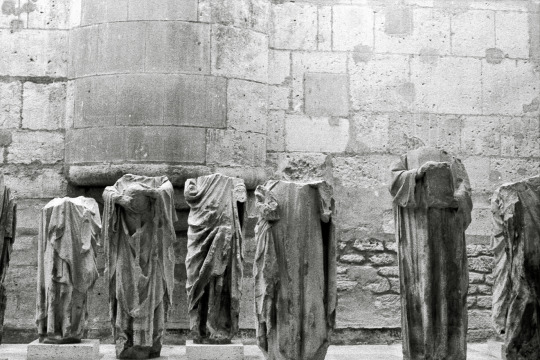
1985 Paris, Musée de Cluny
#1985#Parts#Musée de Cluny#Headless#Acéphale#analog photography#photography#original photographers#Pierre Wayser
10 notes
·
View notes
Text
idk i guess my general belief is that trying to politicize your aesthetic tastes or aestheticize your political views is never really a good idea
#actually there was a lecture i listened to where the speaker was talking about georges bataille's thoughts on this sort of thing#vis-à-vis his antifascist politics and acéphale which were super interesting#i took some notes but i need to find a text where bataille really explains it#text
15 notes
·
View notes
Text
anyway i know i'm not saying anything new but i rly wish we lived in a culture with a greater emphasis on like... critical reading and poetic/metaphoric literacy?
idk i just don't think that every time i say lolita is one of my favorite books i should have to add the caveat of like "but i don't condone ____!" or have to clarify that i'm talking about metaphors when i say incest can be a really important theme worth exploring.
it's not just that it's annoying on a personal level but also that it's reductive on the level of a literary politic that uses taboo to deconstruct or reimagine power in really significant ways!
transgression is a tool! discomfort is a framework! roll in it, writhe in it, bask in its light!
5 notes
·
View notes
Text

Statue acéphale et très érodée de l'époque de l'Empire romain, Vaison-la-Romaine, Vaucluse, 2016.
#statue#roman empire#headless#saison la romaine#vaucluse#provence-alpes-côte-d'azur#france#2016#photographers on tumblr#black and white
38 notes
·
View notes
Text

🌟 Le phallus de Conard
Commençons par présenter Nicholas John Conard. Cet archéologue américain - né le 23 juillet 1961 à Cincinnati* dans l'Ohio - vit et travaille depuis 1995 à Tübingen, en Allemagne, où il dirige le département de Préhistoire de l'université Eberhard Karl.
En 2008, Nicholas J. Conard et son équipe menèrent des fouilles dans la grotte de Hohle Fels, laquelle se trouve dans une région du Jura souabe connue depuis les années 70 du XIXème siècle pour la richesse et l’importance de ses sites préhistoriques.
Plusieurs campagnes de fouilles - en 1958-1960, 1977 et 2002 - avaient en effet permis de découvrir dans cette région de remarquables objets datant du paléolithique supérieur comme cet incroyable homme-lion sculpté dans un morceau d’ivoire de mammouth que l’auteur de ces lignes vous invite ardemment (et malignement) à chercher par vous-même.
Vous comprendrez aisément, cela dit, les raisons qui conduisirent Nicholas Conard à Hohle Fels. La pêche s’annonçaient fructueuse. Et elle le fut !
Imaginez l’excitation des archéologues guidés par un Conard inspiré lorsqu’ils mirent au jour une vénus acéphale** (c’est à dire sans tête), plusieurs flûtes qui comptent parmi les plus anciens instruments de musique du monde ainsi qu’un phallus en siltite polie de belles dimensions.
Jugez-en.
Daté de 28 à 27 000 ans BP, ce dernier, marqué par plusieurs stries, ne mesurent pas moins de 19,2 centimètres de long, 3,6 centimètres de large et 2,8 centimètres d'épaisseur.
Est-on sûr, cela dit, qu’il s’agisse bien d’un phallus ? Ne pourrait-il s’agir d’autre chose ? Une babiole inutilement décorative par exemple ? Le lecteur en jugera.
Ci-dessous : le phallus de Conard se trouve aujourd’hui parmi les collections du musée de la Préhistoire de Blauberen (Urgeschichtliches Museum Blaubeuren dans la langue d’Otto von Bismarck).
*Une ville tout d’abord baptisée du nom de Losantiville, dénomination abandonnée en 1790 pour celle de Cincinnati en l’honneur de Georges Washington, le Cincinnatus du nouveau monde. Antiquité, tu es partout !
**Laquelle vénus évoque plus une volaille prête à cuire qu’une déesse de l’amour.
9 notes
·
View notes
Text
tagged by @kommunarde to talk about five things i like. i can definitely do that :-)
1. i like history and recently i've been focusing on the nineteenth century for some reason because it's a time period we tend to not study a lot in schools anymore. and when we do study it i start having amnesia because of unrelated factors (in quatrième i was suicidal and in première i was too busy getting brain damage from supernatural. i only started really killing it in history class in my last year of high school when we talked about economy and politics as factors all the time). it has been crazy to realize specifically the articulation between the french revolution the empire the other revolutions in france the second empire the commune the first world war and so on and so on. like to me until recently there was a huge hole between 1794 and 1914 and i knew about the events that happened in between obviously but i wasn't really connecting them well. and right now i am making the connections it's actually maddening. for example victor hugo author of les misérables french poet novelist playwright politician and overall legend lived at the same time as karl marx which somehow never occured to me. but now it has and i feel like i've unlocked a secret of the universe. & we'll be studying a time period from the late nineteenth century to the 30s next year. i fr can't wait to go back to history class in september it's going to be so awesome!!!
2. dark netflix is one of my favorite tv shows of all time it's basically about becoming your own worst enemy and how fate might or might not be inescapable. it's a circular narrative spanning multiple generations and decades and universes. it's awesome it has everything important namely philosophy failed marriages and killing people with rocks. it's a crime tv show slash horror slash mystery except then it becomes something else i can't tell you about but fleabag voice this is a love story. it's like stranger things if stranger things was better and about something else entirely. it's incredibly smart and it's the only tv show i've rewatched so far in my life because it's just so well made i don't think i'll ever see something like that again. i can't tell you about it without spoiling it and it's definitely necessary to not look at anything online before finishing the show but please watch it please please please
3. i love falling into wikipedia rabbit holes!! everyone makes fun of me for it because apparently that's not a "reliable source" (some students don't go to the source section and look up the sources listed, and instead they mindlessly copy what the page says instead of going deeper in research or at least rephrasing it a little or just. at least at the very least deleting the hyperlinks. that could not be me! wikipedia is a great tool when you know how to use it and when you use it to its full potentialities. i could never hate wikipedia my beautiful website. it's just that some people are really not smart when it comes to plagiarism). and also because reading stuff for fun and remembering all of it forever is not "something everyone does" and i need to "get diagnosed with autism". WHATEVER. i'll remain cool and knowledgeable about many fun facts and you'll do nothing about it. what i have open right now: prépa as a system, the far left in france, a bunch of pages about the weimar republic, republican calendar, pierre-sur-haute military radio station, les cloches de bâle, rené girard, lycurgus, junge welt, sdaj (i've been looking up far left looking stuff i see stickers for as a desperate attempt to understand the political landscape of this country but alas it's something that wikipedia cannot bring me i think), harmodius and aristogeiton, maquis du limousin, acéphale. also chronology of social movements in france (i am cooking something)
4. okay bear with me for this one because it's going to sound insane and parasocial but i'm aware that it is so it's basically fine. maybe. it's not that i "like" him he's just extremely entertaining and something is wrong with him in a way that is also wrong with me. so there's this guy who used to be in charge of the social media strategy for arguably the most famous french left-wing politician (jean-luc mélenchon, our bernie sanders, even though that's not an adequate comparison because france is a pays finito as i like to call it but not as finito as the united states of america. anyway) and said politician is like 70 but every once in a while during the presidential campaign he made this really funny social media post and every jeune con dépolitisé was like oh mr mélenchon you know memes you're so cool i'm going to vote for you. not me because i'm a critical thinker and i can't even vote but i do love myself a good reformist grandpa post i'm sorry. the first half of 2022 was a weird time. and we knew the guy behind that it was the guy i'm going to be talking about next. so we did not win that presidential election obviously (insert image of me crying tears of blood) (it's fine haha reformism is a dead end) and we have this second round between margaret thatcher and a fascist. but since we do not have a loser mindset and need to bounce back (this country is rotten to the core and we are never going to win electorally or otherwise unless a biblical level miracle happens. when i talk to my neighbors and my family members and my classmates i realize how fucked we are and how truly awful it could get and how easy it would be for a lot of us to look away. it makes me a little sick to think about. but there is much pain in the world but not in this room right?) they said hey! vote for us in the legislative elections! and in france we have a constituency system basically you have a local mp. so our social media guy became a candidate! and he was elected! and then inexplicably (i've followed him for several years and can confirm it came out of the blue) the man turned into a hardcore robespierrist like a month into it. i got really into the french revolution in may to cope with well everything so i was like oh okay interesting that's cool. it's cringe because he's a grown man with a job but it's also sort of funny, in an absurd way. it's a waste of taxpayer money but he's a good mp as far as mps go and i don't pay taxes so i don't care. and at first it was just like a few tweets here and there, he also invited a ya author who makes educational tiktoks about the terror to the national assembly in robespierre cosplay, but recently well uh. he quotes either robespierre or the 1793 constitution literally every intervention. he wore a wig. we're technically in the same political movement because i was peer pressured into joining and in my city the choice is between them or maoists (which way modern man). but i don't have the time to be that invested unfortunately since i have to go to my beautiful torture labyrinth (prépa) every day. during the pension reform protests (don't even talk to me about it.......) a few videos of him surfaced going to face the police in order to well i don't know intimidate them with his écharpe de député into not being violent anymore. it didn't work he got hit tear gassed multiple times but then he had proof of police violence and he could say look at this it's not normal and it didn't achieve much because this country may be beyond hope but it's very brave of him i think. or in another video he was being kettled with a colleague and said colleague was like hey antoine can you quote an article of the declaration of the rights of man and of the citizen at this policeman? and he did. like overall he's a really cool mp he's just also very dedicated to rehabilitating robespierre for some kind of reason. and the real life embodiment of this emoji combination 🤓☝️. and he has a child i think. and we're twitter mutuals
5. i like this poem i think about it so often i have bits of it memorized bouncing around in my head like a dvd screensaver. the way i want you has its own climate like how storms are magnetic. shortest war on earth. every room i enter is empty and i wake searching for you still. and so on and so on i actually want to chew on the poem a little it's like a really comfortable mattress but for my brain if that makes sense
okay this got long!! tagging @isaidilovedu2death @brutalistarchitecture2 @vassyflorence @sotiriabellou and anyone else who wants to do it really. please tell me about things you like!! i haven't written most of this tonight but tonight i am sad and there is a chance i'll be sad for a little while so tell me about you. i care. i love to hear about the things you all are passionate about. if not in public send me a dm. actually you can send me a dm about virtually anything
12 notes
·
View notes
Text
Kimitake Hiraoka was the sacrificed and the character he invented and lived in, Yukio Mishima, was the sacrificer. The moment the sword entered the belly, the two became one and the beheading is the sacrifice that was required by Bataille’s Acéphale.
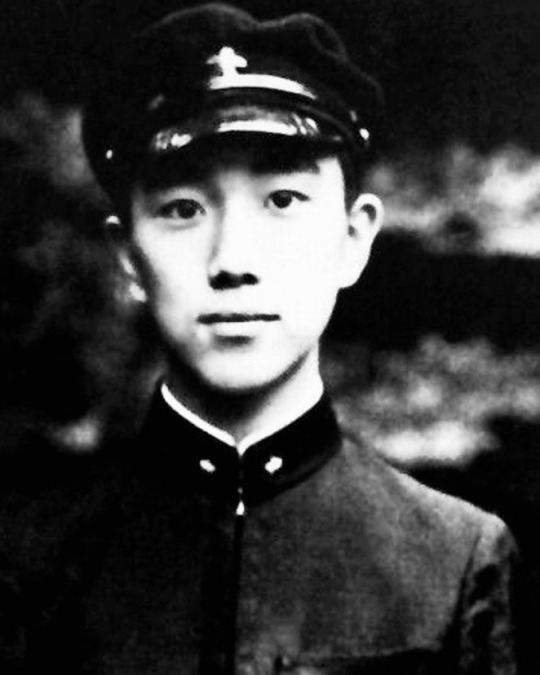

“The Victim, Sacred and Cursed
The victim is a surplus taken from the mass of useful wealth. And he can only be withdrawn from it in order to be consumed profitlessly, and therefore utterly destroyed. Once chosen, he is the accursed share, destined for violent consumption. But the curse tears him away from the order of things; it gives him a recognizable figure, which now radiates intimacy, anguish, the profundity of living beings.
Nothing is more striking than the attention that is lavished on him. Being a thing, he cannot truly be withdrawn from the real order, which binds him, unless destruction rids him of his "thinghood," eliminating his usefulness once and for all. As soon as he is consecrated and during the time between the consecration and death, he enters into the closeness of the sacrificers and participates in their consumptions: He is one of their own and in the festival in which he will perish, he sings, dances and enjoys all the pleasures with them. There is no more servility in him; he can even receive arms and fight. He is lost in the immense confusion of the festival. And that is precisely his undoing.
The victim will be the only one in fact to leave the real order entirely, for he alone is carried along to the end by the movement of the festival. The sacrificer is divine only with reservations. The future is heavily reserved in him; the future is the weight that he bears as a thing. The official theologians whose tradition Sahagún collected were well aware of this, for they placed the voluntary sacrifice of Nanauatzin above the others, praised warriors for being consumed by the gods, and gave divinity the meaning of consump-tion. We cannot know to what extent the victims of Mexico accepted their fate. It may be that in a sense certain of them "considered it an honor" to be offered to the gods. But their immolation was not voluntary. Moreover, it is clear that, from the time of Sahagún's informants, these death orgies were tolerated because they impressed foreigners. The Mexicans immolated children that were chosen from among their own. But severe penalties had to be decreed against those who walked away from their procession when they went up to the altars. Sacrifice comprises a mixture of anguish and frenzy. The frenzy is more powerful than the anguish, but only providing its effects are diverted to the exterior, onto a foreign prisoner. It suffices for the sacrificer to give up the wealth that the victim could have been for him.
This understandable lack of rigor does not, however, change the meaning of the ritual. The only valid excess was one that went beyond the bounds, and one whose consumption appeared worthy of the gods. This was the price men paid to escape their downfall and remove the weight introduced in them by the avarice and cold calculation of the real order.” - Georges Bataille, ‘The Accursed Share: An Essay on General Economy’ (1949) [p. 59 - 61]

#bataille#georges bataille#mishima#yukio mishima#sacrifice#accursed share#acephale#acéphale#tatenokai#general economy#general economics#aztecs
14 notes
·
View notes
Text
catholicism and cannibalism romanticizers of tumblr please start reading georges bataille we need to refound acéphale 🙏
7 notes
·
View notes